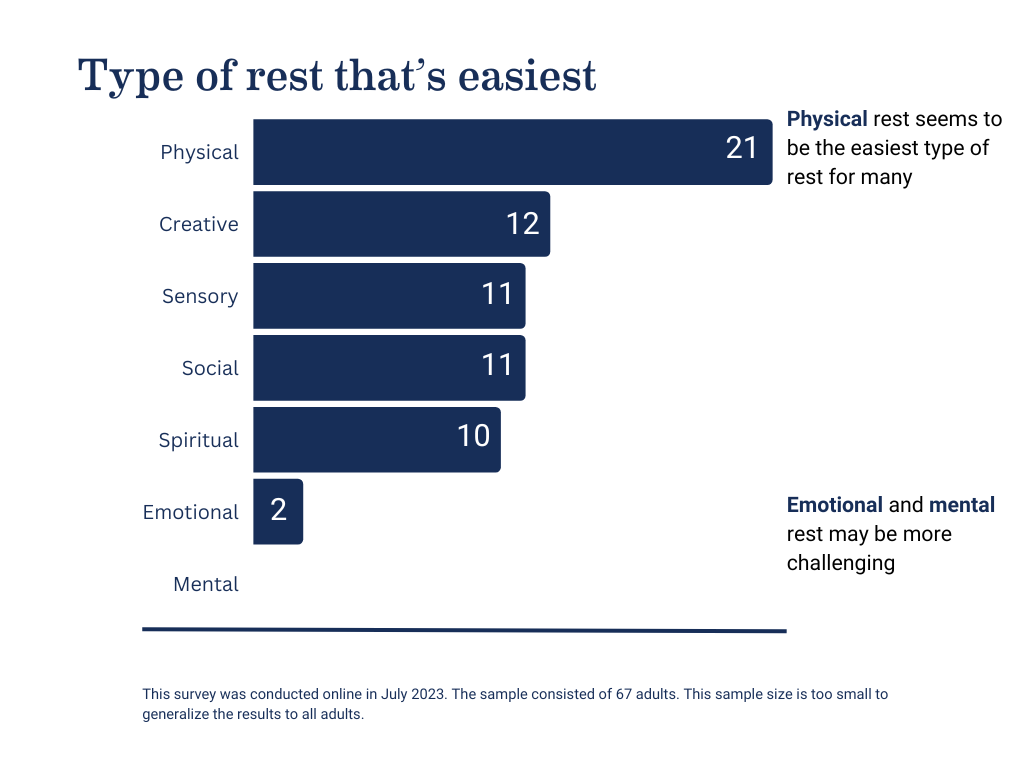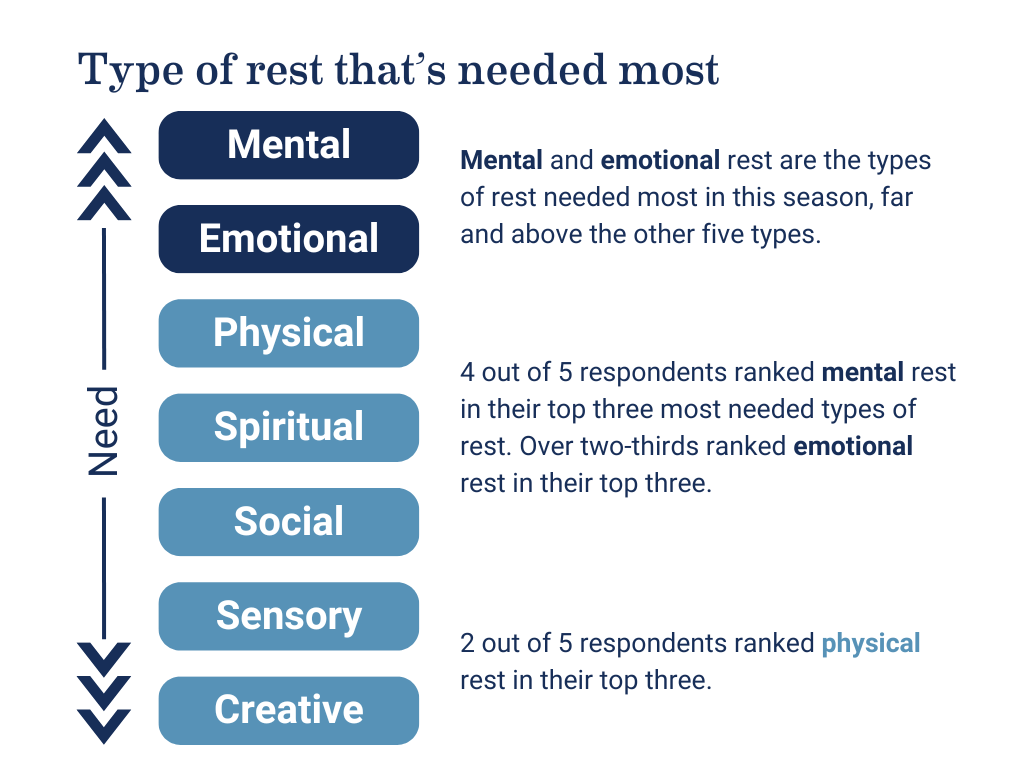The Types of Rest We Need
I don’t know about you, but when I think of rest, my brain starts conjuring up images of my weighted blanket, a cabin in the woods, a rocking chair on a screened-in porch, and the beach. That’s because I often associate rest with sleep or vacation; rest is about ceasing my daily activities or my daily work.
In her TEDxAtlanta talk, Dr. Saundra Dalton-Smith says that we actually need seven different types of rest:
- Physical
- Mental
- Sensory
- Creative
- Emotional
- Social
- Spiritual
We were curious to learn about the types of rest you need. So in July 2023, we conducted a simple survey to find out. Sixty-seven people completed the survey–54 women and 13 men. Just over half of the respondents were 60 years or older. Here’s what we learned.
Physical Rest Comes Easiest for Many
We asked which of the seven types of rest comes easiest. Physical rest topped the chart. The data also indicated that mental and emotional rest may be the most difficult to find.

Most Needed Rest: Mental and Emotional
We also asked which type of rest people most needed in this season. They responded to this question by ranking the seven types from most needed to least needed. The results revealed that mental and emotional rest are needed more than the other types. Four out of five respondents ranked mental rest in their top three most needed types of rest. Over two-thirds ranked emotional rest in their top three. By comparison, only two out of five ranked physical rest in their top three.

Obstacles to Getting the Rest We Need
Getting the rest we need isn’t easy. We asked, “What is the single biggest obstacle to getting the rest you most need in this season?” Responses fell into a few broad categories.
Busyness
Busyness was the single biggest obstacle to getting adequate rest. Respondents have a lot of responsibilities from work to parenting. One person said the “demands of daily living” were their biggest obstacle. Another said that they’re “constantly on the go.” In short, many people felt like they simply didn’t have time to get the rest they needed most.
Lack of Self-Discipline
Several respondents said that they, themselves, were their biggest obstacle. They realize they struggle to prioritize their needs for rest, have trouble turning off their minds, or lack the desire or motivation. One person admitted that their problem was plain laziness.
Physical Limitations
Others ran up against limitations, particularly physical ones. Some people are ironically just too tired to get the rest they need. Two people mentioned needing consistent restful sleep. (I wonder if any of them are parenting young children.) One person admitted not having the physical strength to get the rest they need. Another mentioned health limitations.
Relational Limitations
A handful of respondents mentioned relational limitations including having access to their “tribe.” Some are navigating relational conflict. One individual noted that loneliness was their biggest obstacle.
Finally, a few respondents mentioned work stress, fear, and anxiety as obstacles to getting the rest they need.
In short, many people felt like they simply didn’t have time to get the rest they needed most.
Getting the Rest We Need
This survey had a small sample size; therefore, we can’t generalize the results to all people everywhere. But the findings can help us examine our own needs for rest, particularly mental and emotional rest. If you need mental rest, consider taking microbreaks throughout the day. If you need some ideas, check out the ones I included in this article on ways to manage stress. Beyond the microbreaks, maybe you can find pockets of mental rest in other moments of your day. I love reading popular fiction in the evenings because it helps my brain downshift after a long day of analysis, strategic thinking, or highly-detailed work.
When it comes to emotional rest, Dr. Dalton-Smith recommends finding time to express your emotions—to feel your feels. Journaling can help. Several leaders we interviewed in our recent research study mentioned journaling as a vital part of their growth and development. Not sure where to start with journaling? Check out this article. And if you’re picky about your paper and need something quality to hold your questions and quandaries, here are two of my favorites: the PAPERAGE journal and the ZenART journal. (Don’t worry, these aren’t affiliate links.)
And for those of us who lack the self-discipline to go after the rest we so desperately need, let’s remember that small changes over time can add up. I’m reminded of how James Clear describes incremental change in his book Atomic Habits. He talks about continuous 1% improvements. What would it look like to invest a little more time and effort into getting the rest you need each week? Perhaps you start with two, five-minute microbreaks tomorrow and work up to two, ten-minute microbreaks by the end of the month. Maybe you start with five minutes of journaling before you go to bed this week and bump it up to six next week. See what happens. Maybe the rest you get from starting small will give you the momentum you need to keep going.
What would it look like to invest a little more time and effort into getting the rest you need each week?
Banner image by Priscilla du Preez on Unsplash.

Meryl Herr
Director of Research and Resources
Dr. Meryl Herr is the Director of Research and Resources at the Max De Pree Center for Leadership where she designs and conducts research studies that add to the understanding of what helps marketplace leaders flourish. She also oversees the team’s efforts to convert research findings into r...


